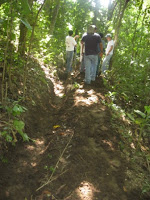 |
| Left to right: Muslim Imam Dr. Armando Bukele, Episcopal Father Luis Serrano, Lutheran Bishop Medardo Gomez |
I must confess; I have never celebrated Reformation Day. I did write a paper in high school about the significance of the Reformation, but until this year I was not even aware that such a “holy day” existed. Here in El Salvador the protestant churches take this celebration seriously. And not just the Lutherans, whose church carries the name of the Father of the Reformation, Martin Luther.
Invited to a Reformation Celebration were the Baptists, the Episcopalians, the Reformed Calvinists and Presbyterian (me), hosted by the Lutherans and with a keynote address by the Imam (worship leader) of the Muslim Community in San Salvador. In his powerful and inspiring address, Dr. Bukele shed light on the Reformation from a different perspective. A process that on the outside appears to have irreparably divided the Church forever has also given way to an ecumenical movement that includes and unites people. It is not about institutions. When we make the Reformation about denominations and religious systems we miss the point.
Reformation is making a change for the better, not only in institutions but in our practice of living, not only in the religious arena, but in social and political life as well. When we challenge ourselves and each other, as sisters and brothers, to keeping striving to make a change for the better, to keep reforming, we live into the Reformation. And as Dr. Bukele so passionately shared, “a church committed to social justice, committed to love and concern for neighbor, a church of actions not just words, is a church reformed...Christian or Muslim, that church resembles God, not an institution made by man.”
~ ~ ~ ~ ~
~ ~ ~ ~ ~
Other signs of reformation…
A lesson in permaculture in Lirios, a community outside the city of San Salvador.
Permaculture is the practice of creating agricultural and community systems based on the relationships found in natural ecologies.
 Here these practices are being used to restore the soil and the underground water table. By digging ditches to channel rain water the soil retains moisture longer into the dry season, allowing trees and plants to thrive throughout the year. This not only provides a canopy of shade serving to significantly cool the immediate area, but the vegetation also “breathes” fresh, clean air into the atmosphere helping to counteract the effects of heavy air pollution in the nearby city.
Here these practices are being used to restore the soil and the underground water table. By digging ditches to channel rain water the soil retains moisture longer into the dry season, allowing trees and plants to thrive throughout the year. This not only provides a canopy of shade serving to significantly cool the immediate area, but the vegetation also “breathes” fresh, clean air into the atmosphere helping to counteract the effects of heavy air pollution in the nearby city.~ ~ ~ ~ ~
 |
| With Pastora Norma and Rev. Jeff Johnson, Chaplain of University Lutheran Chapel, UC Berkeley at Cordero de Dios (Lamb of God) Lutheran Church in Soyapango, one of San Salvador's neighboring cities. |
Rather than pack up and move the church, or at very least the worship service into a more secure community, Pastors Norma and husband Rafael believe that this is exactly where God needs them the most; where God's presence is most needed. They have embraced the youth of this neighborhood and try to offer them an alternative to the dangerous yet tempting lifestyle of easy money in organized crime. A group of teenagers have started a band, and with Rafael's leadership they are practicing covers and writing their own songs. They also lead rocking praise music on Sundays that rivals any contemporary service I've ever seen!
Two of the band members will be starting university studies next year, one to become a teacher. These youth are thriving in a place where opportunites are few and far between, they have a reason to hope even amidst so much hopelessness. With just the handful of pennies, nickels, dimes and quarters that make it to the offering plate each week, this little church is making a striking change for the better; reforming its community.
¹http://wordnetweb.princeton.edu/perl/webwn?s=reformation


